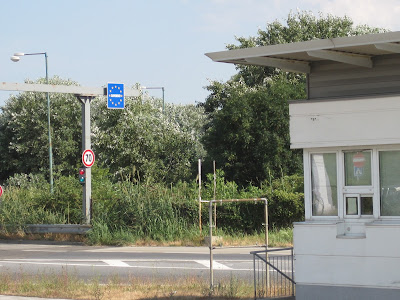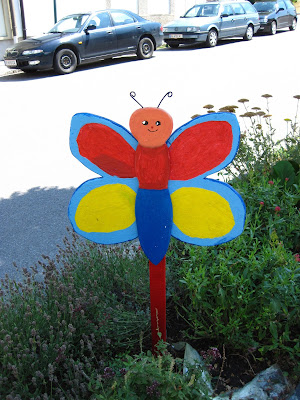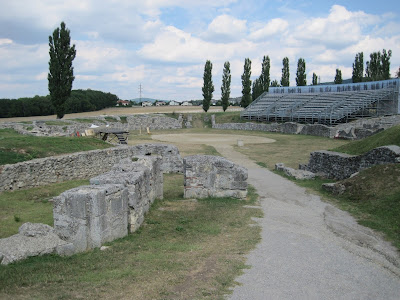This photo isn't the most picturesque from our bike ride from Bratislava to some Austrian villages, but I'll argue that it's the most historically significant:
That yellow building in the background is the former customs building in Berg, Austria. That empty patch of road is where travelers would sit for hours as guards checked cars leaving the former Czechoslovakia (before 1993) or Slovakia (after 1993). Communism fell in November 1989, the Czech and Slovak republics split in 1993, but cars weren't free to cruise on through to Austria or other neighboring countries until less than six years ago.
Before late November 1989, natives of the former Czechoslovakia weren't even allowed to leave the country unless they were important or special enough. After 1989, when they could leave, the average border stop would still last 2-3 hours. Sometimes, if something was suspected stolen or someone who shouldn't be leaving was suspected of leaving, border guards would stop every car. Otherwise the guards would randomly select cars to direct to the side and search.
There were still restrictions on what people could bring to Austria or Germany, so those families who could travel but were unable to afford, say, eating out for every meal in those countries, were allowed to bring only so much food out of the country. I can't speak to this, but the Special Assistant to the Blogger can, and her family would always (a) make sure whatever they brought didn't exceed what was allowed and (b) include a 2-3 hour wait into their travel plans. Families who chose to bring more food than was allowed packed the extras with their clothes, where they (often correctly) figured the guards wouldn't bother checking.
And then came 21 December, 2007, when the Czech Republic and Slovakia were among nine nations to join the
Schengen Area -- the European nations where one can travel across borders without being stopped. Goodbye barbed wire and armed guards on their posts, hello freedom.
Celebrations included fireworks and a disco event at the Berg crossing. From
this report by Czech Radio:
Back at the Austrian-Slovak border, in Berg, I could feel that today we witnessed a historical moment for Slovakia given the fact that 18 years ago this place was surrounded by barbed wire and many Slovaks were killed trying to cross it in order to escape from the communist part of Europe.
Communist propaganda was praised [sic] the border guards for being very effective in catching all those who tried to cross the border. The use of arms was regarded as a normal practice. The border guards were supposed to be envied by everybody, among other things, for spending their working hours in nature. ...
I was wondering what might these former border guards who served during communism think today? Well, none of those we found wanted to be interviewed. And if I am allowed a personal comment, I am sure that most of them enjoy the new freedom of travelling to capitalist Vienna, without being stopped and checked.
Today, traveling from Austria to Slovakia is as easy as zipping under this sign:
 |
| The sign reads "Slovensko," in case you can't read it. |
But limiting the effect to cars doesn't tell the whole story. Cycling from Slovakia to Austria (and vice versa) has become a popular way for tourists and natives to spend their summer days. Some companies offer Vienna-to-Budapest packages that include stops in Bratislava. The Special Assistant to the Blogger and I settled for a daylong jaunt to Bad Deutsch-Altenburg (German spa-old castle), Austria, where we ate traditional meals at a fifth-generation restaurant and continued just past town to see an old Roman amphitheater.
 |
| A woman walking her cow, and her dog, in the Austrian countryside. |
 |
| The Danube in Hainberg. |
 |
The top of Roman columns at the Carnuntum museum in Bad Deutsch-Altenburg.
The Romans liked the area and set up an army base roughly 2,000 years ago. |
 |
| Saw these butterflies all over Bad Deutsch-Altenburg. |
 |
Remains of a Roman amphitheater past Bad Deutsch-Altenburg.
They still have concerts here. |
 |
The past and present meet at the Austrian-Slovak border. In the background,
a cafe and accommodation. In the front, an old sign marking distances
to Vienna and Pressburg (the German name for Bratislava). |

